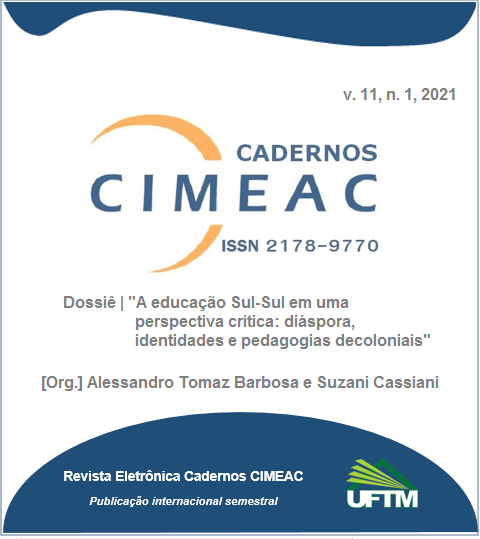Etnografia como campo de pesquisa na e para a prática docente de professores indígenas Iny-Karajá que ensinam Ciências e Matemática
DOI:
https://doi.org/10.18554/cimeac.v11i1.5243Resumen
Este trabalho é proveniente de um estudo desenvolvido na Comunidade Indígena Itxala, município de Santa Terezinha, Estado de Mato Grosso, acerca das práticas socioculturais empreendidas pelos indígenas Iny-Karajá em distintas atividades cotidianas que contemplam as paisagens de manifestações culturais e originárias do povo das águas. Como ponto de partida, trazemos a seguinte indagação: Em que termos é possível etnografar os saberes originários do povo Iny-Karajá na perspectiva de mobilizar e potencializar ações educativas para a sala de aula? Nesse sentido, objetivamos descrever as práticas socioculturais que podem mobilizar e potencializar atividades para o ensino de Ciências e Matemática. O estudo pauta-se na abordagem qualitativa de cunho etnográfico, permitindo evidenciar as impressões e as percepções dos professores, por meio da entrevista narrativa e da participação para observar o cotidiano desses indígenas no decurso da realização de suas práticas socioculturais, com destaque para as pinturas corporais e as ações educativas. Nossas reflexões evidenciam, dentre outras possibilidades, o compartilhar de novos conhecimentos e de atividades escolares na e para a sala de aula mediadas por elementos socioculturais do contexto comunitário, emergindo a negociação de significados como estratégia mediadora e potencializadora do aprendizado de Ciências e Matemática no contexto escolar local.
Palavras-chave: Práticas socioculturais. Atividades educativas. Ensino de Ciências e Matemática.
Abstract: This work comes from a study developed in the Itxala Indigenous Community, located in the municipality of Santa Terezinha, State of Mato Grosso, Brazil. It is focused on addressing socio-cultural practices of the Iny-Karajá indigenous people during their different daily activities, which include cultural and original manifestations of the people of the waters. As a starting point, we bring the following question: How is it possible to know, through ethnography, the knowledge originating from the Iny-Karajá people in the perspective of mobilizing and enhancing educational actions for the classroom? So, we aim to describe the socio-cultural practices that can mobilize and enhance activities for the teaching of Science and Mathematics. This study is based on a qualitative ethnographic approach, allowing to evidence the impressions and perceptions of teachers through narrative interview and participation, with the intention of observing the daily lives of these indigenous people during the performance of their socio-cultural practices, with emphasis on body paintings and educational actions. Among other possibilities, our reflections show the sharing of new knowledge and school activities in and for the classroom, mediated by sociocultural elements of the community context, making the negotiation of meanings emerge as a mediating and enhancing strategy for the learning of Sciences and Mathematics in the local school context.
Keywords: Sociocultural practices. Educational activities. Science and Mathematics Teaching.
Descargas
Publicado
Número
Sección
Licencia
Os autores que publicam nesta revista concordam com os seguintes termos:
(a) Não cobramos dos autores para a publicação neste periódico.
(b) Autores mantém os direitos autorais e concedem à revista o direito de primeira publicação, com o trabalho simultaneamente licenciado sob a Licença Creative Commons que permite o compartilhamento do trabalho com reconhecimento da autoria e publicação inicial nesta revista.
(c) Autores têm permissão e são estimulados a difundir e a distribuir a versão publicada de seu trabalho online (ex.: em repositórios institucionais ou na sua página pessoal) após o processo editorial, já que isso pode aumentar o impacto e a citação do trabalho publicado (Veja O Efeito do Acesso Livre).
* * *
AUTHORS COPYRIGHT AND PUBLISHING RIGHTS
Authors who publish with this journal agree to the following terms:
(a) This journal does not charge authors for publication.
(b) Authors retain copyright and grant the journal right of first publication with the work simultaneously licensed under a Creative Commons Attribution License that allows others to share the work with an acknowledgement of the work's authorship and initial publication in this journal.
(c) For authors whose articles have been accepted: authors are permitted and encouraged to post their work online (e.g., in institutional repositories or on their website) after the publication of the text in Cadernos CIMEAC, as it can lead to productive exchanges as well as earlier and greater citation of published work (See The Effect of Open Access).

 10.18554/cimeac
10.18554/cimeac

